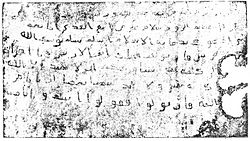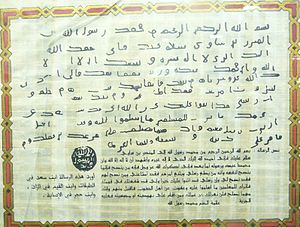- Muhammad's letters to the Heads-of-State
-
- This is a sub-article to Muhammad in Medina.
After the Treaty of Hudaybiyyah, Muhammad decided to send letters to many rulers of the world, inviting them to Islam [1] [2][3]
Overview
Muhammad, according to the usually told Islamic historiography, sent ambassadors with such letters to Heraclius the emperor of Byzantium, Chosroes II the emperor of Persia, the Negus of Ethiopia, Muqawqis the ruler of Egypt, Harith Gassani the governor of Syria and Munzir ibn Sawa the ruler of Bahrain. The account as transmitted by Muslim historians reads as follows:
“ من محمد بن عبد الله إلى هرقل عظيم الروم: سلام على من اتبع الهدى، أما بعد فإنى أدعوك بدعوة الإسلام . أسلم تسلم ويؤتك الله أجرك مرتين ، فإن توليت فإن عليك إثم الأريسيِّين. و يا أهل الكتاب تعالوا إلى كلمة سواء بيننا وبينكم ألا نعبد إلا الله ،ولا نشرك به شيئا،ولا يتخذ بعضنا بعضا آربابا من دون الله فإن تولوا فقولوا اشهدوا بأنا مسلمون
In the name of God the Beneficent, the Merciful: (This letter is) from Muhammad son of Abdullah to Heraclius the Great (ruler) of the Romans (Byzantines). Peace be upon him, he who follows the right path. Furthermore I invite thee to Islam; become a Muslim and thou shalt be safe (from Hell or God's punishment), and God will double thy reward (as your people will follow along and be saved because of you), and if thou rejectest, thou shalt bear the sins of persecuting Arians.(And I recite to you God's Statement:) (O Muhammad): 'and people of the scripture! Come to a word common to you and us that we worship none but God and that we associate nothing in worship with Him, and that none of us shall take others as Lords beside God. Then, if they turn away, say: 'Bear witness that we are Muslims' (those who have surrendered to God).
” —[4]
The letter to Chosroes II is similar except that it refers to Magians instead of the Arians.
————————————————————
“ Letter of the Prophet Muhammed to the Negus كتاب رسول الإسلام إلى النجاشي
بسم الله الرحمن الرحيم من محمد رسول الإسلام إلى النجاشى ملك الحبشة: سلام عليك إنى أحمد الله إليك ،الله الذي لا إله إلا هو الملك القدوس السلام المؤمن المهيمن، وأشهد أن عيسى بن مريم روح الله وكلمته ألقاها إلى مريم البتول الطيبة الحصينة، فحملت بعيسى فخلقه الله من روحه كما خلق آدم بيده، وإنى أدعوك وجنودك إلى الله عز وجل، وقد بلغت ونصحت فاقبلوا نصحى، والسلام على من اتبع الهدى
In the name of God the Beneficent, the Merciful: From Muhammad the Prophet of Islam to the Negus, the king of Ethiopia: peace be on you, I thank God for you, The God, who is no god but him, the King, the Holy Faith, the Guardian, and I witness that Jesus, the son of Mary, the Spirit of God and His Word. The word he gave to the Virgin, the believer Mary, and from this word she bears Jesus. God created Jesus from his soul just as he created Adam. I invite you and your soldiers to believe the God the Almighty. I wrote and advised you, so accept my advise. Peace upon those who follow the right way.
” ————————————————————
Letter of the Prophet Muhammed to Munzir ibn Sawa Al Tamimi.[5]. The top shows an original copy while the bottom is a modern reprint for clear representation.
“ Letter of the Prophet Muhammed to Munzir ibn Sawa Al Tamimi رساله محمد للمنذر بن ساوي التميمى
بسم الله الرحمن الرحيم، من محمد رسول الله إلى المنذر بن ساوي، سلام عليك، فإني أحمد إليك الله الذي لا إله إلا هو، وأشهد أن لا إله إلا الله، وأن محمداً عبده ورسوله. أما بعد: فإني أذكرك الله عز وجل، فإنه من ينصح فإنما ينصح لنفسه، ومن يطع رسلي ويتبع أمرهم فقد أطاعني، ومن ينصح لهم فقد نصح لي، وإنّ رسلي قد أثنوا عليك خيراً، وإني قد شفعتُكَ في قومكَ، فاتركْ للمسلمين ما أسلموا عليه، وعفوتُ عن أهل الذنوب فاقبل منهم، وإنك مهما تصلح، فلن نعزلكَ عن عملك، ومن أقام على يهودية أو مجوسية فعليه الجزية.
In the name of God the Beneficent, the Merciful: From Muhammad the Prophet of God to Munzir bin Sawa, may peace be on you! I praise God, who is one and there none to be worshiped but except him. I bear evidence to the oneness of God and that I am a servant of God and his Prophet. Thereafter I remind you of God. Whoever accepts admonition does it for his own good. Whoever followed my messengers and acted in accordance their guidance; he, in fact, accepted my advice. My messengers have highly praised your behavior. You shall continue in your present office. You should remain faithful to and his Prophet. I accept your recommendation regarding the people of Bahrain. I forgive the offenses of the offenders.
Therefore, you may also forgive them of the people of Bahrain whoever want to continue in their Jewish or Majusi faith, should be made to pay Jizia. Seal: God’s Prophet Muhammad[6]
” References
- ^ Lings, Martin (1994). Muhammad: His Life based on the earliest sources. Suhail Academy Lahore. p. 260.
- ^ Khan, Dr. Majid Ali (1998). Muhammad The Final Messenger. Islamic Book Service, New Delhi, 110002 (India). pp. 250–251. ISBN 81-85738-25-4.
- ^ Haykal, Muhammad Husayn (1993). The Life of Muhammad (Translated from the 8th Edition By Ism'il Ragi A. Al Faruqi). Islami Book Trust, Kula Lumpur. p. 360.
- ^ At-Tabari, Tarikh al-umam wal-muluk
- ^ Photo was taken in the Sana'a military museum in Sana'a
- ^ Translation was copied and modified from some websites here [1], [2]. It would be appreciated if there is a better translation.
Categories:- Islam stubs
- Life of Muhammad
- Correspondence
Wikimedia Foundation. 2010.


